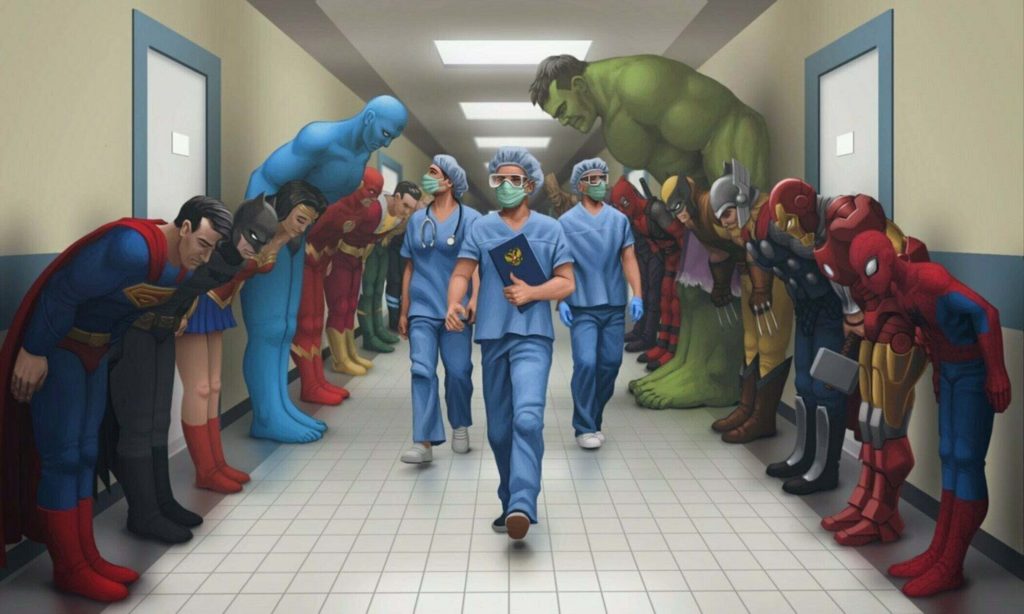Society has taken to calling those that continue to provide essential services through the pandemic heroes. This refrain continues to be used by society through every disaster, but this time it’s different. This time, essential workers are not there by choice.
Despite this, they are still forced to grapple with the prospect of their own mortality. And not just their own; when they go home, they are putting their families at risk as well. It is a difficult choice for many. Some feel pressured to continue to work by their civic duty and professional responsibilities, as is the case for many physicians and healthcare professionals. Far more, such as grocery workers and restaurant employees, feel pressured by their employers or their financial situation.
The impacts are therefore disproportionately felt by those at the bottom rungs of society whose work can often only be done in-person. In contrast, the wealthy can settle down in their home offices and use their laptops to continue doing the vast majority of their work remotely. In between are physicians and healthcare professionals. Traditionally seen as wealthy, they are nonetheless still at risk, particularly those caring for COVID-19 patients.
People have thus lauded healthcare workers, calling them the heroes of our age. That refrain has gone on to be used for all essential workers. But this hero talk obscures greater truth.
It can be difficult to focus on seemingly anything other than the coronavirus and COVID-19. But, as a consequence of this pandemic, a lot of the subtle issues that have always plagued our society have come to the front and center. These are trying times, and so, we should use them to reflect and ponder, think of solutions, and most importantly act on them today so that they are no longer problems tomorrow.
We have quickly realized that the world is more interconnected and interdependent than ever before. And while this comes with amazing benefits under normal circumstances, these are not normal circumstances. It seems that with every passing day, we have drifted away from normalcy; from those halcyon days we remember.
Sadly, even back then, the same problems existed. But they were swept under the rug. No one cared enough to address them because everything was moving forward, the world was becoming a better place. Society had a collective optimism about the future. And that was reflected in its values, its books, its movies. Slowly we moved into the idea of a cyber-dystopia. You can see it everywhere in the popular media of our time.
Finally, society has realized that the people we once overlooked, are in fact the ones we depend on the most. Take the grocery store employees, for example.
Working in a grocery store has earned me and my co-workers a temporary status. After years of being overlooked, we suddenly feel a sense of responsibility, solidarity, and pride. . . . A sign attached to the shirt read NOT ALL HEROES WEAR SCRUBS.
I’m grateful to be acknowledged for the risky work we’re doing. Being in an environment where morale is up despite global uncertainty is encouraging. But I have a problem with all this hero talk. It’s a pernicious label perpetuated by those who wish to gain something—money, goods, a clean conscience—from my jeopardization.
[. . .]
Unlike medical personnel and emergency responders, we didn’t sign up for potentially life-threatening work.
[. . .]
Cashiers and shelf-stockers and delivery-truck drivers aren’t heroes. They’re victims. To call them heroes is to justify their exploitation. By praising the blue-collar worker’s public service, the progressive consumer is assuaged of her cognitive dissonance. When the world isn’t falling apart, we know the view of us is usually as faceless, throwaway citizens. The wealthy CEO telling his thousands of employees that they are vital, brave, and noble is a manipulative strategy to keep them churning out profits.
Karleigh Frisbie Brogan
This sentiment is echoed by others in the industry: “We didn’t sign up to be heroes, and we certainly didn’t sign up to be martyrs,” says Maria Leon
I’m not sure that doctors and nurses did either.

I’ve been to disasters all over the world, and I have always seen health-care providers pour in to help. Usually, within an hour, there are more than are needed—nurses, lab workers, X-ray technicians, doctors. No one has to ask; they just show up. And then they work nonstop until someone makes them take a break or they fall exhausted. It’s what we do.
But that sort of bravery, that work ethic, is not boundless. No one is so fearless or stupid as to discount all risks.
[. . .]
This is the dark secret of planning for a pandemic that can also kill health-care providers and their families. When we prepare for disasters, we plan using the mnemonic “Staff, stuff, space, and systems.” We can always make more space by wedging an extra bed in, or by repurposing another building. We can buy more stuff, supplies, and equipment. We can find new supply lines, reboot our computer systems. But we cannot conjure up doctors and nurses and health-care technicians. Physicians take at least 11 years to train after high school. Nurses at least four. Techs take years or months.
The United States needs its health-care workers to see it through this crisis. But there are no replacements on the shelf. They can’t be built, trained, or repurposed from other jobs. Unless the country does dramatically more to provide them with the equipment they need to do their job safely, to assure them they will be cared for if they fall ill, and to provide their family with a measure of security, it risks losing them. What happens when they need to be quarantined? When they start to die? Or don’t come to work?
Thomas Kirsch
Despite the sacrifices that doctors, nurses, and other clinicians make, I’m not sure that many of them would have imagined that their own mortality, much less the mortality of their loved ones, would be at stake as a result of their work.
Society has now come to grips with a question that no one really wants to know the answer to: are physicians, healthcare professionals, grocery store workers, and other essential workers still responsible for coming in to work?
I hope we don’t come close to the answer that we all know.
Clap for me and other healthcare workers at seven o’clock if it makes this pandemic feel more bearable. I concede, your cheers help us trudge on. Just know that cheers and hollering don’t change the outcome. This is my fervent plea – that we change what we can after all this is over.
KP Mendoza
Mendoza’s poignant call reminds us of the stakes. No one can escape the pandemic, much less its drastic effects. This will live on for the rest of our lives, perhaps longer. It is now up to us if it will result in good, or no action at all.
Dossier
“No One Is Supporting the Doctors,” by Steven McDonald, April 18, 2020. https://www.theatlantic.com/ideas/archive/2020/04/doctors-already-manage-alone/610249/
“Calling Me a Hero Only Makes You Feel Better,” by Karleigh Frisbie Brogan, April 18, 2020. https://www.theatlantic.com/ideas/archive/2020/04/i-work-grocery-store-dont-call-me-hero/610147/
“I Did Not Sign Up for the Military. I Signed Up for Walmart,” by Anna North, April 23, 2020. https://www.vox.com/2020/4/23/21229942/coronavirus-grocery-store-workers-walmart-covid-pandemic
[Facebook Update], by KP Mendoza, April 14, 2020. https://www.facebook.com/kp.mendoza.23/posts/10216675050615188
“America’s Other Heroes,” by David Goldfein, March 31, 2020. https://www.theatlantic.com/ideas/archive/2020/03/americas-other-heroes/609145/
“The Reason Hospitals Won’t Let Doctors and Nurses Speak Out,” by Theresa Brown, April 21, 2020. https://www.nytimes.com/2020/04/21/opinion/coronavirus-doctors-nurses-hospitals.html
“What Happens If Health-Care Workers Stop Showing Up?” by Thomas Kirsch, March 24, 2020. https://www.theatlantic.com/ideas/archive/2020/03/were-failing-doctors/608662/

Zainab
Sahil, what you have put down is such a reality!
Sahil
Thanks! Appreciate your comment!
Al
Agree, The society as such is selfish and will only reflect when things hurt. During good times “who cares” attitude. We have seen this for example in war torn middle east there is no talk about heroes who help even risking their lives.
Zubin
Thank you for helping in the effort to shed light on an evergrowing problem. Understanding the real impact on small actions that may seem innocent helps us as a community to grow and become a better and hopefully healthier place. Once again, great job with your amazing writing that helps readers like me!
Al
I agree with you Zubin, Sahil has brought forth an insightful debate.
Nasima
You wrote the reality of current situation of whole world, it is very impressive.
Nitin Chandel
Great job putting in perspective the sentiments & conviction of the essential workforce. We are beckoned by this virus to pay attention.